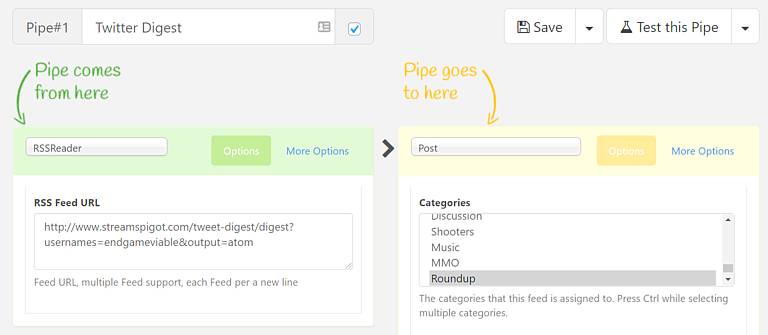Twitter Digest Posts
I’ve been mildly interested in setting up a system of gathering my tweets into digests and posting them on the blog periodically, maybe once a week. I just like the idea of keeping all of my writing in one convenient place, for myself if nothing else. It seems like something that should be very easy to do, but of course, it’s 2020, and all of the computing world has moved into walled garden silos where you’re forced to adopt somebody else’s stockholder-approved idea of an ideal workflow.
I’ve been mildly interested in setting up a system of gathering my tweets into digests and posting them on the blog periodically, maybe once a week. I just like the idea of keeping all of my writing in one convenient place, for myself if nothing else.
It seems like something that should be very easy to do, but of course, it’s 2020, and all of the computing world has moved into walled garden silos where you’re forced to adopt somebody else’s stockholder-approved idea of an ideal workflow.
I did manage to find a single free web site that will take your tweets and make a daily digest out of them. It’s called Stream Spigot. Here’s a portion of what my tweets from yesterday looked like:

That’s more-or-less exactly what I want. Except I think I’d prefer a weekly digest instead of a daily digest. That’s not the real problem, though. The real problem is that a web site doesn’t help me very much. I need a way to get that data into a blog post.
It turns out Stream Spigot lets you format the digest as an Atom feed, so you can read it with your favorite RSS reader. It looks like this:

That’s fantastic, and another step in the right direction. Unfortunately it formats the RSS content with basically the same HTML tags as the web site (using a table!), which is less than ideal for my purposes, but I’ll get to that in a second.
If we can make an RSS feed out of Twitter digests, the next thing we need to do is figure out how to import RSS feed entries into a WordPress blog post. It turns out that if you Google “import rss feed into wordpress,” you get about 50,000 different results, because apparently making RSS-related plugins is a popular business model for WordPress plugin developers. Most of the “how to” results involve buying and installing somebody’s favorite fly-by-night plugin, is what I’m saying.
However, after delving through the mire and muck of the scammy WordPress plugin underworld for a while, I found a free plugin called WP Pipes. Using an overly-complicated UI, it allows you to import RSS entries from a feed and create new blog posts from them, which is exactly what I want.

This is where I ran into the problem of Stream Spigot’s HTML tags, because the blog posts that I managed to create from my Twitter digests looked terrible.
In the end, I’m left no closer to what I want than when I started. But, at the bottom of the Stream Spigot web page, there’s a tiny little link that says “Source available on GitHub.” Maybe I can use that as a starting point to make a custom solution.
As with most computing tasks I want to accomplish in 2020, it turns out that “just writing the damn thing myself” might be the easiest and fastest and cheapest way to accomplish exactly what I want to do.